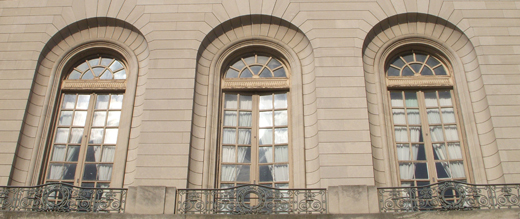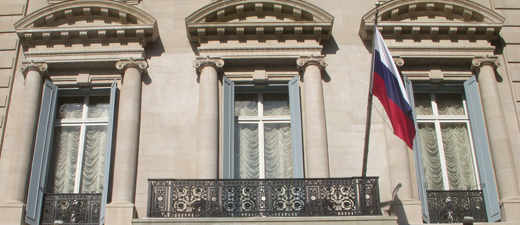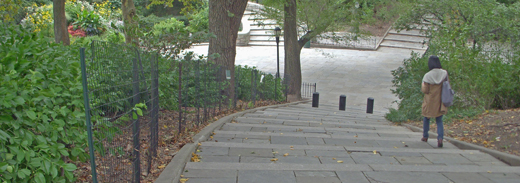Office/Diary: Tuesday
Tuesday, October 20th, 2009
Call me “Doodad” — that’s what my grandson will call me. It’s official: the name received the parental seal of approval at dinner this evening. Kathleen will continue a tradition, and go by the name of Darney, which is what I called my mother-in-law from shortly before my marriage to her death a few weeks ago. It is what she (Kathleen’s mother) called her mother, when, as a little girl, she couldn’t quite parrot her mother’s “Goonight, darling.” It is also — and this is the tradition that Kathleen intends to continue — what all of the first Darney’s grandchildren called their grandmother. This produced many double-takes whenever I spoke of my mother-in-law to Kathleen’s cousins. — But Darney (they wanted to say) is dead.
Long live Darney! And Doodad.
¶ Matins:  At The Millions, Sonya Chung writes with great thoughtfulness about “The Mommy Problem” for serious writers. In our view, this goes far beyond mothering young children, and might better be posed as “The Writer Problem” for friends and relations. Ms Chung quotes Lorrie Moore, from this interview with ELLE:
The detachment of the artist is kind of creepy. It’s kind of rude, and yet really it’s where art comes from. It’s not the same as courage. It’s closer to bad manners than to courage. Or it’s just some willingness to, you know, take a few rotten tomatoes flung your way. You’re going to offend somebody, and you have to be prepared for it. You have to be prepared to say, ‘Oh, no. I swear to God that wasn’t you. I’m sorry.’ Because it isn’t them. It can be a mess. But if you’re going to be a writer, you basically have to say, ‘This is just who I am, and this is what I am going to do.’ There’s a certain indefensibility about it. It’s not about loving your community and taking care of it—you’re not attached to the chamber of commerce. It’s a little unsafe.
While we’re talking about Lorrie Moore, I want to mention the most dispiriting passage that I’ve happened upon in her beautiful new novel, A Gate at the Stairs. I’m not going to quote from it here, but I will give a reference: It begins on page 154 and continues for almost five pages. It consists of snippets of rant that the narrator, Tassie Keltjin, overhears as she “supervises” the children of liberal people who attend her employer’s support group for (mostly) white parents of adopted children of diverse racial backgrounds. What’s dispiriting is the lack of discipline; as long as people espouse right-sounding opinions, it doesn’t matter how half-baked they are — not to them, at least. It wasn’t lost on me that the group never articulates a concrete objective.
¶ Lauds: A new entry at Amassblog. JP Williams shares some of his photographs of gloves found in the street. (With a bit of spiffy white shoe.) JP still uses a “film camera,” and, what’s more, insists on having his rolls developed in Paris! C’est la vie!
The irony was almost sickening. Conservatives, those believers in the theory of  independent initiative, meld into anthills of absolutely socialist cohesion when opposing a policy that they don’t like; paradoxically and counter-productively, the need for concerted action acts as a kind of Miracle-Gro on liberal differences, blotting out the sunlight that might fall on concerted progressive action. Is every population as self-defeatingly screwed-up as ours?
¶ Prime: For a change: a good, old-fashioned insider trading ring. The six insiders include hedge fund Galleon Group founder Raj Rajaratnam and IBM outsourcer Robert Moffatt. (Cringely on Moffatt.)
We had dinner with the impending parents at their favorite restaurant, Jane, on Houston Street. (It’s their favorite restaurant for dinner with antiquities of my vintage, anyway.) I was sluggish all day and in no mood to leave the apartment, so I did what I usually do now when I find myself in funky, mildly antisocial moods: I got dressed long before I had to and headed for The SoHo-Greenwhich Village border as soon as I was ready. My idea was to stop in at McNally Jackson, which, if not exactly en route, was not wildly out of the way.
¶ Tierce: A recently-established site, Letters of Note. Genuine epistles. Snail mail from the past. Compulsively readable. (via The Morning News)
As always, I thought of Maggie Gyllenhaal as I crossed the intersection of Prince and Lafayette. My sighting of the actress occured a block to the west (Prince and Crosby), but now, whenever I go to McNally Jackson, I’m stirred by the excited idea that anything can happen in New York. More observant people see celebrities as a matter of course, but for me such encounters are rare and startling.
¶ Sext: A bouquet of Crash Blossoms, at Good. To lay upon the tomb of Lady Mondegreen.
I hadn’t been to McNally Jackson in a while, which made me feel guilty; and I felt even worse when I walked in on a reading. Victor Lodato was talking about his novel, Mathilda Savitch. I hadn’t heard of the writer, and I didn’t try to follow the discussion, as I looked for a book to buy in reparation for my long absence; but I came away curious all the same.
¶ Nones: China in Frankfurt: “We did not come to be instructed about democracy.â€
Most of my time at McNally Jackson was spent, however, pawing the metaphorical ground outside the lower-level rest room, within which, I could very easily tell, a young lady was Taking Her Time. When I arrived on the scene, the toilet portion of the boudoir experience was drawing to a close. There was a flush, and the sound of running water, and the roar of the hot-air drier. Almost ten minutes passed between the suddent quiet that followed the drying of hands and the lady’s emergence from her new-found bower. Every now and then, she could be heard taking a step or two — it was audibly obvious that she was wearing high-heeled boots — and then there would be silence. Then another step — but never an approach to the door. I became quite not-quite polite about rattling the doorknob, and I considered actually knocking.
¶ Vespers: At The Second Pass, Emma German reports on a recently republished vampire novella by — are you sitting down? — George Eliot, The Lifted Veil.
(I bought The Lifted Veil, but that was after I’d had my minute in the rest room.)
¶ Compline: Are you reading this ventrally or dorsally? (Great put-down for clotted, poorly printed prose: “It’s awfully dorsal.”)
I expect that each of my importunements dilated her sense of entitlement, but by the time she fianlly emerged I hated her far too gustily to mind having encouraged her. A well-put together young woman (exactly as I’d expected), she turned out to be rather plain and potato-faced — which can only mean that her insolence has its roots in devastating brilliance. Although she didn’t have the courage to reproach me, with a basilisk glance, for my impatience at the doorknob, I myself had no difficulty staring lasers right through her curly coiffure. “Hot as any Hottentot and not the goods for me!”



















